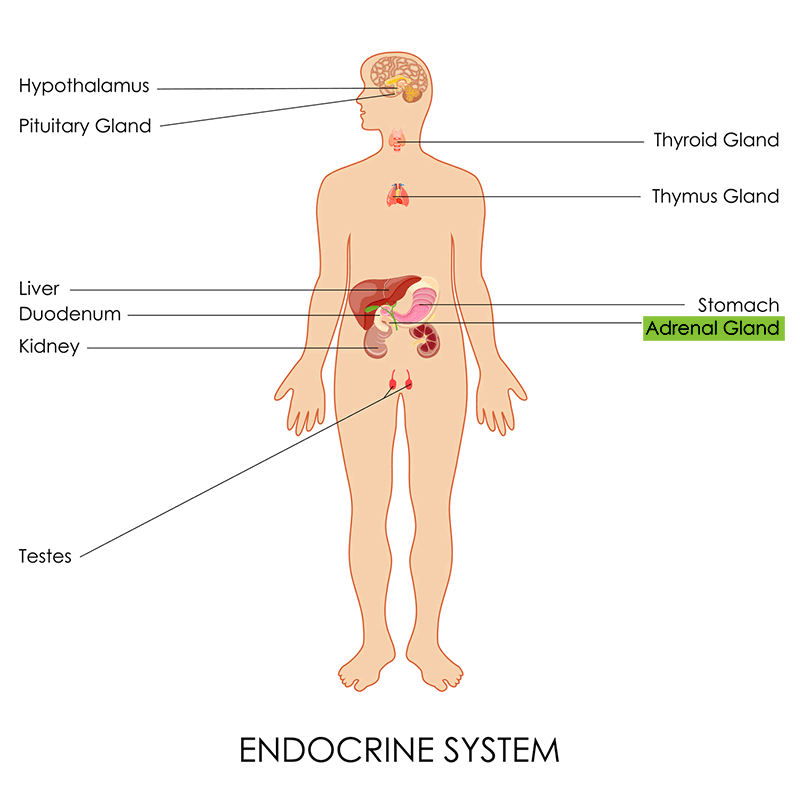International Leader In Functional Medicine
Bellissimo Medical in Weston and Miami, Fl.Adrenal Function
No bigger than a walnut and weighing less than a grape, each of your two adrenal glands sits like a tiny pyramid on top of a kidney (“ad” “renal” means “over” the “kidneys”). But don’t let their size fool you; these powerful little endocrine glands manufacture and secrete steroid hormones such as cortisol, estrogen and testosterone that are essential for life, health and vitality. They modulate the functioning of every tissue, organ and gland in your body to maintain homeostasis during stress and keep you alive. They also have important effects on the way you think and feel.
The main purpose of your adrenals is to enable your body to deal with stress from every possible source, ranging from injury and disease to work and relationship problems. They largely determine the energy of your body’s responses to every change in your internal and external environment. Whether they signal attack, retreat or surrender, every cell responds accordingly, and you feel the results. It is through the actions of the adrenal hormones that your body is able to mobilize its resources to escape or fight off danger (stress) and survive. In a more primitive society that would mean being able to run away quickly, fight or pursue an enemy or game, endure long periods of physical challenge and deprivation, and store up physical reserves when they are available. In modern society, these same responses are triggered by such circumstances as a difficult boss, air pollution, family quarrels, financial problems, too little sleep and overindulgence in or sensitivities to food or drugs. If your adrenal function is low, as it is in adrenal fatigue, your body has difficulty responding and adapting properly to these stresses. This can lead to a variety of physical and psychological health problems that are themselves a further source of stress.
It is also your adrenal glands’ job to keep your body’s reactions to stress in balance so that they are appropriate and not harmful. For example, the protective activity of anti-inflammatory and anti-oxidant adrenal hormones like cortisol helps to minimize negative and allergic reactions (such as swelling and inflammation) to alcohol, drugs, foods, environmental allergens, cancer, infection, and autoimmune disorders. These hormones closely modulate the utilization of carbohydrates and fats, the conversion of fats and proteins into energy, the distribution of stored fat (especially around your waist and at the sides of your face), normal blood sugar regulation, and proper cardiovascular and gastrointestinal function. After mid-life (menopause in women), the adrenal glands gradually become the major source of the sex hormones circulating throughout the body in both men and women. These hormones themselves have a whole host of physical, emotional and psychological effects, from the level of your sex drive to the tendency to gain weight. Every athlete knows that steroids (adrenal hormones) affect muscular strength and stamina.
Cortisol and Adrenal Function
Cortisol is a life sustaining adrenal hormone essential to the maintenance of homeostasis. Called “the stress hormone” because it influences, regulates or modulates many of the changes that occur in the body in response to stress, including, but not limited to:
- Blood sugar (glucose) levels
- Fat, protein and carbohydrate metabolism to maintain blood glucose (gluconeogenesis)
- Immune responses
- Anti-inflammatory actions
- Blood pressure
- Heart and blood vessel tone and contraction
- Central nervous system activation
Cortisol levels normally fluctuate throughout the day and night in a circadian rhythm that peaks at about 8 AM and reaches it lowest around 4 AM. While it is vital to health for the adrenals to secret more cortisol in response to stress, it is also very important that bodily functions and cortisol levels return to normal following a stressful event. Unfortunately, in our current high-stress culture, the stress response is activated so often that the body does not always have a chance to return to normal.
*This can lead to health problems resulting from too much circulating cortisol and/or from too little cortisol if the adrenal glands become chronically fatigued (adrenal fatigue).*
Higher and more prolonged levels of circulating cortisol (like those associated with chronic stress) have been shown to have negative effects, such as:*
- Impaired cognitive performance
- Dampened thyroid function
- Blood sugar imbalances, such as hyperglycemia
- Decreased bone density
- Sleep disruption
- Decreased muscle mass
- Elevated blood pressure
- Lowered immune function
- Slow wound healing
- Increased abdominal fat, which has a stronger correlation to certain health problems than fat deposited in other areas of the body. Some of the health problems associated with increased stomach fat are heart attacks, strokes, higher levels of “bad” cholesterol (LDL) and lower levels of “good” cholesterol (HDL), which can lead to other health problems.*
Chronically lower levels of circulating cortisol (as in adrenal fatigue) have been associated with negative effects, such as:*
- Brain fog, cloudy-headedness and mild depression
- Low thyroid function
- Blood sugar imbalances, such as hypoglycemia
- Fatigue – especially morning and mid-afternoon fatigue
- Sleep disruption
- Low blood pressure
- Lowered immune function
- Inflammation








